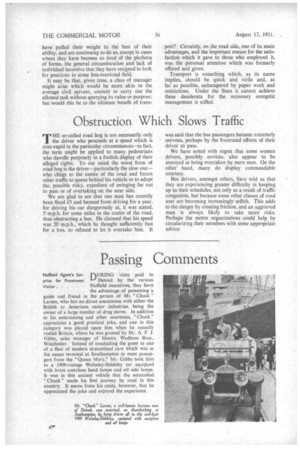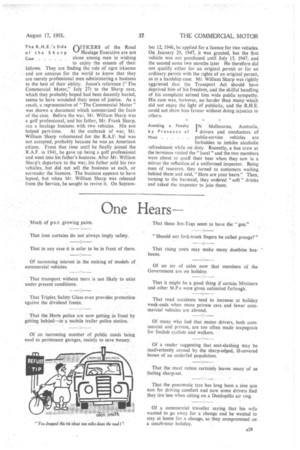Passing Comments
Page 30

Page 31

If you've noticed an error in this article please click here to report it so we can fix it.
Nuffield Agent's Sur-DURING visits paid to prise for Prominent A—F Detroit by the various Visitor Nuffield executives, they have the advantage of possessing a guide and friend in the person of Mr. "Chuck " Larsen, who has no direct association with either the British or American motor industries, being the owner of a large number of drug stores. In addition to his entertaining and other courtesies, "Chuck" appreciates a good practical joke, and one in this category was played upon him when he recently visited Britain, where he was greeted by Mr. A. F. J. Gibbs, sales manager of Messrs. Wadham Bros., Winchester. Instead of conducting the guest to one of a fleet of modern streamlined cars which was at the ocean terminal at Southampton to meet passengers from the "Queen Mary," Mr. Gibbs took him to a 1909-vintage Wolseley-Siddeley car equiptied with brass acetylene head lamps and oil side lamps. It was in this ancient vehicle that the astonished "Chuck" made his first journey by road in this country. It seems from his smile, however, that he appreciated the joke and enjoyed the experience. The R .'s Sid e nfF10ERS of the Road ofthe Sharp 1---f Haulage Executive are not Case alone among men in wishing to enjoy the esteem of their fellows. They are finding the role of ogre irksome and are anxious for the world to know that they are merely professional men administering a business to the best of their ability. Janus's reference (" The Commercial Motor," July 27) to the Sharp case, which they probably hoped had been decently buried, seems to have wounded their sense of justice. As a result, a representative of "The Commercial Motor" was shown a document which summarized the facts of the case. Before the war, Mr. William Sharp Was a golf professional," and his father, Mr. frank Sharp, ran a haulage business with two vehicles. His son helped part-time. At the outbreak of war, Mr. William Sharp volunteered for the R.A.E.but was not accepted, probably because he was an American citizen. From that time until he finally joined the R.A.F. in 1941, he gave up being a golf professional and went into his father's business. After Mr. William Sharp's departure to the war, his father sold his two vehicles, but did not sell the business as such, or surrender the licences. The business appears to have lapsed, but when Mr. William Sharp was released from the Service, he sought to revive it. On Septem ber 12, 1946, he applied for a licence for two vehicles. On ,January 29, 1947, it was granted, but the first vehicle was not purchased until July 15, 1947, and the second some two months later He therefore did not qualify either for an original permit or for an ordinary permit with the rights of an original permit, as in a hardship case. Mr. William Sharp was rightly aggrieved that the Transport Act should have deprived him of his freedom, and the skilful handling of his complaint earned him wide public sympathy. His case was, however, no harder than many' which did not enjoy the light Of publicity, and the R.H.E. could not show him favour without doing injustice to others.
Avoiding a Penalty IN Melbourne, Australia, b y Presence of drivers and conductors of Mind public-service vehicles are forbidden to imbibe alcoholic refreshment while on duty. Recently, a bus crew at the terminus visited the "local " and the two members were about to quaff their beer when they saw in a Mirror the reflection of a uniformed inspector. Being men of resource, they turned to customers waiting behind them and said, "Here are your beers." Then, turning to the barmaid, they ordered " soft " drinks and asked the inspector to join them.




















































































